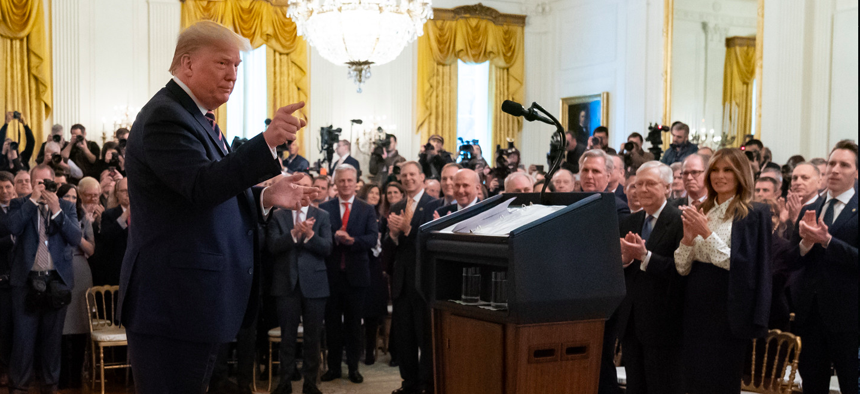
White House Photo
Trump, the GOP and the ‘Swamp:’ A Dangerous New Low in Bureaucrat-Bashing
In the wake of impeachment proceedings, disrespect for and threats against the career federal workforce have escalated.
President Trump’s proposed fiscal 2021 budget released Monday included a laundry list of federal workforce reforms, from overhauling the civil service system to increasing employees’ contributions to their retirement plans. Those proposals were prefaced by an introduction that harkened back to the president’s Christmastime display of affection for the 2 million people who have dedicated their careers to serving the nation.
“As the president expressed in his recent holiday letter to executive branch employees,” the budget document declared, “the vast majority of federal workers, whether they are Veterans Affairs doctors or Border Patrol officers, are dedicated to the mission of public service.”
That holiday letter, you may recall, was entitled “To Our Incredible Federal Workforce.” Unfortunately, that term “incredible” has become a double-edged sword. Because at the same time the president lauds federal employees, he and other Republicans have lined up to question the credibility, integrity, qualifications and even patriotism of federal employees in recent months. The result is a dangerous new low in bureaucrat-bashing.
Trump’s admiration for federal employees is a relatively recent phenomenon. During Public Service Recognition Week in May 2019, he lauded “the valuable role they play in our communities.” But just a few months earlier, during the epic government shutdown, he shared articles on Twitter declaring that few federal employees worked hard or accomplished much.
The recent impeachment proceedings against the president provided the catalyst for another round of fed-bashing. In October, as hearings got underway in the House, an official White House statement declared that in the proceedings, “radical unelected bureaucrats [were] waging war on the Constitution.” The president’s son, Donald Trump Jr., tweeted that “America hired [Trump] to fire people like” former ambassador to Ukraine Marie Yovanovitch, acting ambassador to Ukraine William B. Taylor Jr. and State Department official George Kent. They are “career government bureaucrats and nothing more,” he said.
Then, in the aftermath of the Senate’s vote not to remove President Trump from office, the administration moved swiftly to oust White House and State Department officials deemed insufficiently loyal to the president. These included the highly respected Lt. Col. Alexander Vindman, who had testified before the House impeachment committee. Vindman was escorted from the White House grounds and immediately attacked by the president himself.
“Fake News @CNN & MSDNC keep talking about “Lt. Col.” Vindman as though I should think only how wonderful he was,” Trump said in a series of tweets. “Actually, I don’t know him, never spoke to him, or met him (I don’t believe!) but, he was very insubordinate, reported contents of my “perfect” calls incorrectly, & was given a horrendous report by his superior…”
As Trump and other Republicans unloaded on military officers and diplomats for daring to speak out against the president’s actions regarding Ukraine, House Republicans went a step further, tarring federal employees across government at an event to unveil a plan to overhaul the civil service.
“The fourth branch of government is the bureaucracy,” declared Rep. Mark Johnson, R-La., chairman of the Republican Study Committee at the event. (That “branch” was represented by a gray suit-wearing “swamp monster.”) Agency leaders, the Republicans said, need more authority to punish government employees, because “the Trump administration has at times been burdened as common-sense proposals are undermined by partisan federal bureaucrats.”
“Without a federal workforce made up of true civil servants that are talented, patriotic, and hardworking, meaningful reform cannot be implemented,” they declared.
Note the contrast: “true civil servants” and “partisan federal bureaucrats.”
The lawmakers at the event presented no evidence of systemic partisanship on the part of career federal employees—who, almost to a person, pride themselves on their strict political neutrality and dedication to faithfully carrying out elected officials’ initiatives. (And if it were true that federal workers are motivated by partisanship, Republicans might be surprised at how many are Republicans.)
Bureaucrat-bashing has been a staple of political discourse for decades now, across the political divide. But it’s one thing to declare or insinuate that government employees are unmotivated or lacking in talent. It’s very much another to characterize those who dare to challenge the president as “insubordinate,” “partisan” and not “true civil servants.” That type of language is a direct threat against the “incredible” career employees, managers and executives who seek to do their duty even under the most trying of circumstances.







